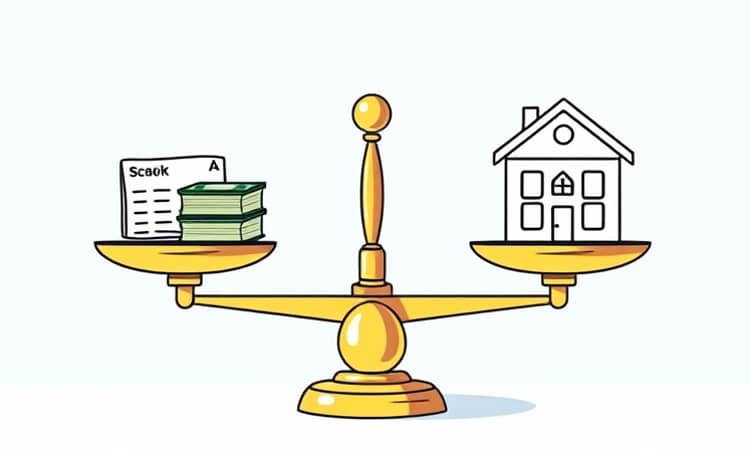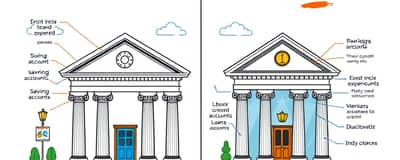With numerous options available for saving and investing money, individuals often find themselves pondering the best way to allocate their funds. Among the popular choices are Certificates of Deposit (CDs) and savings accounts. Each option has unique features that cater to different financial goals and needs, making it crucial to understand their differences before making a decision.
This article explores the key distinctions, advantages, and disadvantages of CDs and savings accounts. We will break down the characteristics of each, provide insights on their pros and cons, and guide you on which option may be the best fit for your financial situation.
Let's delve into the details and help you choose the right place for your hard-earned money.
What’s the Difference?
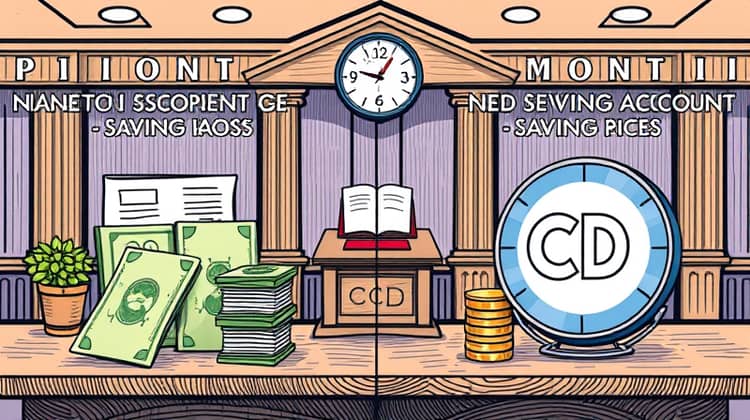
Certificates of Deposit (CDs) and savings accounts are both secure ways to hold money, but they differ significantly in terms of access, interest rates, and investment horizons. Understanding these differences can help you make an informed financial decision that suits your needs.
A savings account is a flexible account offered by banks and credit unions that allows you to deposit and withdraw money with ease. It typically provides lower interest rates compared to CDs but allows for unrestricted access to your funds at any time.
In contrast, a CD is a time deposit that requires you to lock your money away for a fixed period, often ranging from a few months to several years. In return for this commitment, CDs generally offer higher interest rates than savings accounts.
Certificates of Deposit (CDs)

CDs are savings vehicles that require you to agree to leave your money untouched for a predetermined amount of time. This time frame can vary from a few months to multiple years, and you can select the duration that best matches your financial goals.
When you open a CD, you agree to keep your funds deposited for the entire term, and in return, the bank offers a fixed interest rate that is usually higher than a typical savings account. This makes CDs appealing for individuals looking to save for a specific future expense or goal.
Pros of CDs

One of the primary advantages of CDs is the higher interest rate compared to savings accounts. This can lead to greater returns on your deposits over time, especially if you're willing to invest your money for an extended period.
Additionally, CDs are a safe investment, as they are typically insured by the FDIC (up to $250,000). This ensures that your money is protected even if the bank fails. Here are some pros of investing in CDs:
- Higher interest rates than savings accounts.
- Guaranteed returns if kept for the full term.
- FDIC insured up to applicable limits.
These benefits make CDs an attractive option for conservative investors who prioritize safety and guaranteed returns.
Cons of CDs
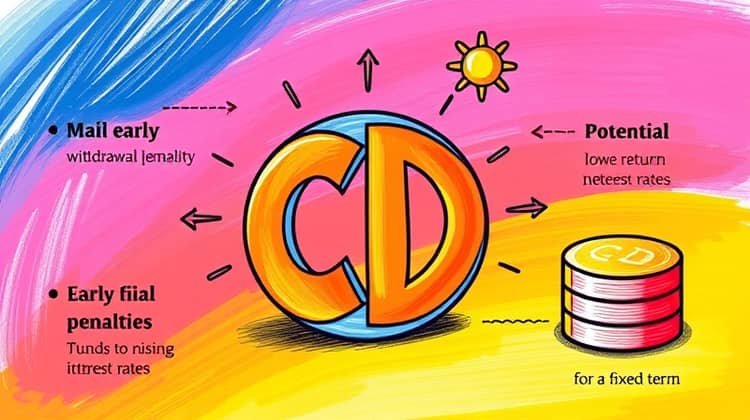
However, CDs are not without their downsides. Once you commit your funds to a CD, accessing that money before the term ends can result in penalties and loss of interest. This can make them less flexible compared to savings accounts that offer more liquidity.
Additionally, if interest rates rise, you may miss out on better returns available through new CDs or savings accounts, as your funds will be locked in at a lower rate. Here are some of the cons of CDs:
- Early withdrawal penalties can reduce your earnings.
- Potentially lower overall returns if interest rates increase.
- Your money is tied up for a fixed term.
These drawbacks can hinder your financial flexibility, making it crucial to assess your cash flow needs before opting for a CD.
Savings Accounts

Savings accounts are a popular choice for individuals seeking immediate access to their funds while still earning some interest. They are offered by most banks and credit unions and are designed for regular deposits and withdrawals.
These accounts usually have lower interest rates than CDs, but they allow you to retrieve your money at any time without penalties. This makes them ideal for emergency funds or short-term savings goals.
Pros of Savings Accounts

The primary advantage of a savings account is liquidity. You can access your money whenever you need it without worrying about penalties, which is crucial for unexpected expenses. Additionally, savings accounts generally have no minimum deposit requirements, making them accessible to everyone.
Another benefit is that many savings accounts are also FDIC insured, providing similar security features as CDs. Here are some pros of a savings account:
- Flexible access to your funds at any time.
- No withdrawal penalties when accessing your money.
- Ideal for setting aside emergency or short-term savings.
This flexibility makes savings accounts an appealing choice for individuals who value easy access to their money while still earning some interest.
Cons of Savings Accounts

Despite their advantages, savings accounts come with some disadvantages. Generally, they offer lower interest rates compared to CDs, which can lead to smaller earnings over time, especially if inflation outpaces the interest rate.
Another downside is that some savings accounts may require a minimum balance to avoid monthly maintenance fees. Here are some cons of savings accounts:
- Lower interest rates compared to CDs.
- Possible monthly fees if minimum balances aren't maintained.
Understanding these limitations is essential in determining whether a savings account aligns with your savings strategy.
Key Differences
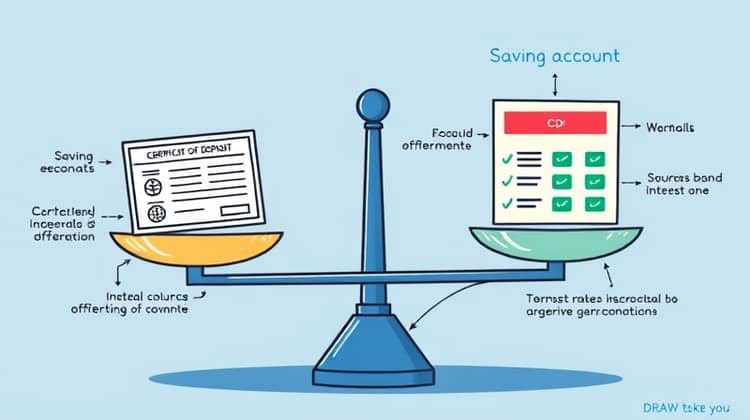
In summary, the differences between CDs and savings accounts are notable and should be carefully considered based on your financial goals. CDs offer better interest rates but at the cost of flexibility, while savings accounts provide unrestricted access to your funds but typically yield lower returns.
It's vital to evaluate your short-term and long-term financial needs before making a decision between these two options. Here’s a quick comparison of the key differences:
- Access to funds: CDs have restrictions, while savings accounts have few limitations.
- Interest rates: CDs generally offer higher rates than savings accounts.
- Terms: CDs require a commitment for a fixed period; savings accounts do not.
The choice between the two should reflect both your current liquidity needs and financial objectives.
Which is Right for You?
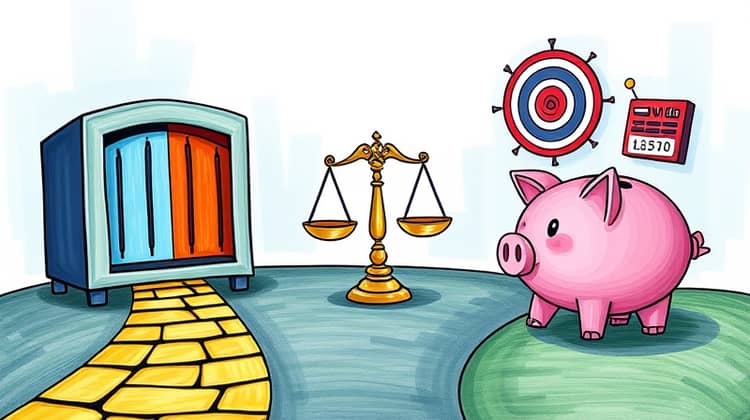
Deciding whether a CD or a savings account is the right option for you depends on your unique financial situation. If you have a specific savings goal in mind and can commit your money for a certain period, a CD might be preferable due to its higher interest rates.
Conversely, if you require immediate access to your funds or are uncertain about your future cash flow needs, a savings account might better serve you. Consider the following factors:
- Your investment time horizon.
- Immediate access vs. earning potential.
- Your financial goals and risk tolerance.
Understanding your priorities is crucial in determining the best choice for your money.
Conclusion

Ultimately, both CDs and savings accounts have distinct benefits and drawbacks that make them suited for different financial strategies. CDs can offer higher returns and are ideal for those who can commit to leaving their money untouched for a defined period. In contrast, savings accounts provide flexibility and immediate access to funds, perfect for short-term needs or emergency savings.
When making a decision, it's essential to weigh your current financial situation, savings goals, and how comfortable you are with the limitations of each option. Whether you choose a CD or a savings account, both can play an important role in your overall financial plan.
By understanding their characteristics, you can better navigate your savings decisions and work towards achieving your financial objectives.

